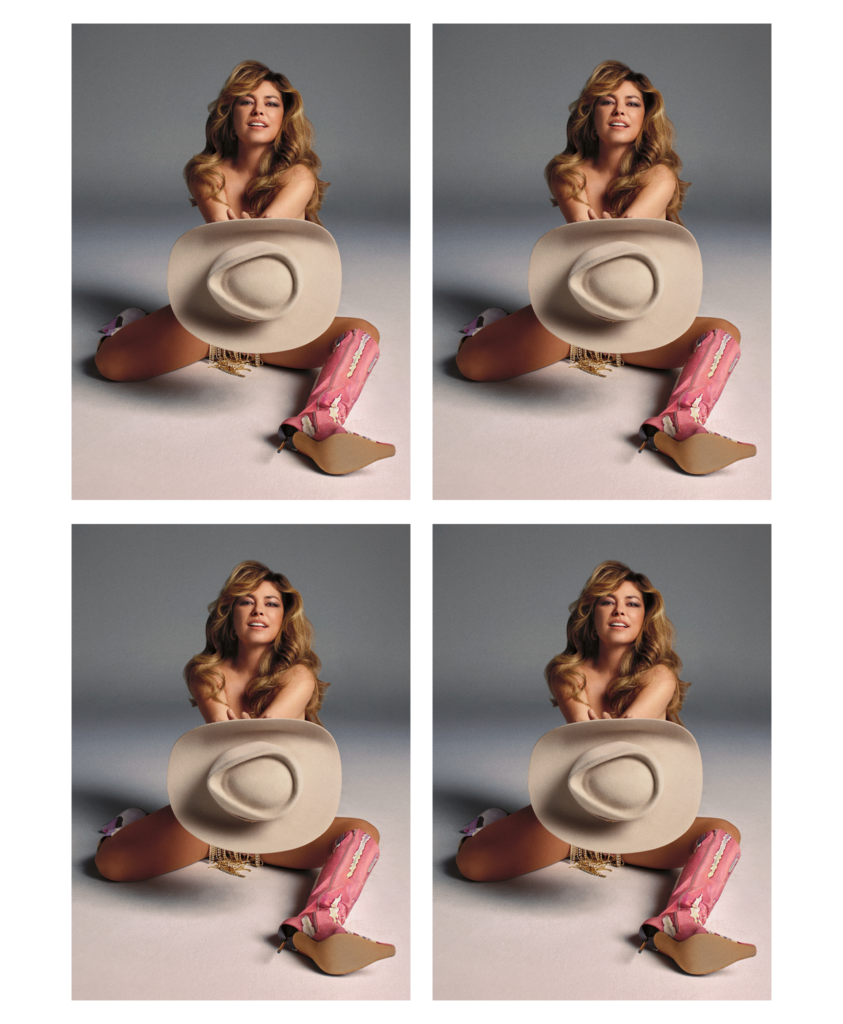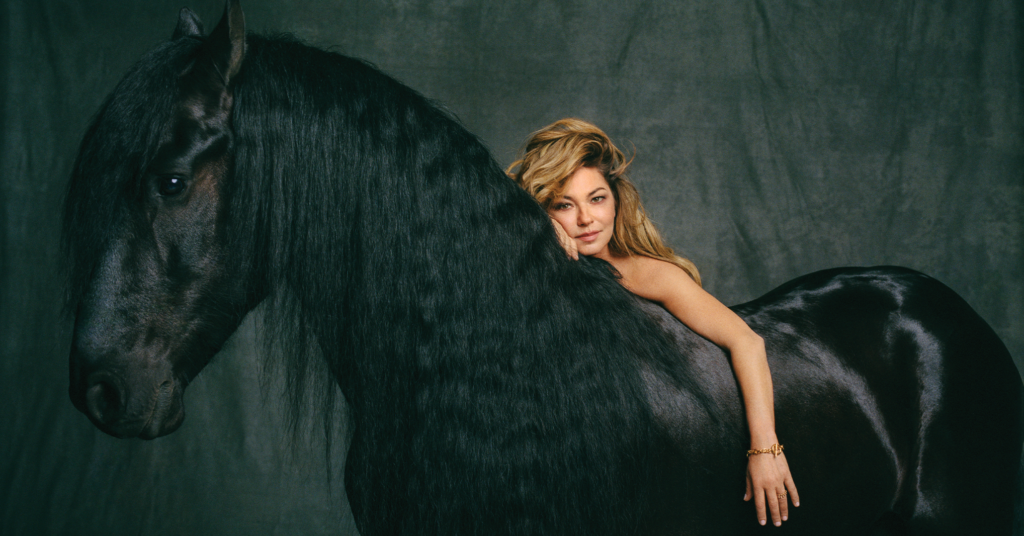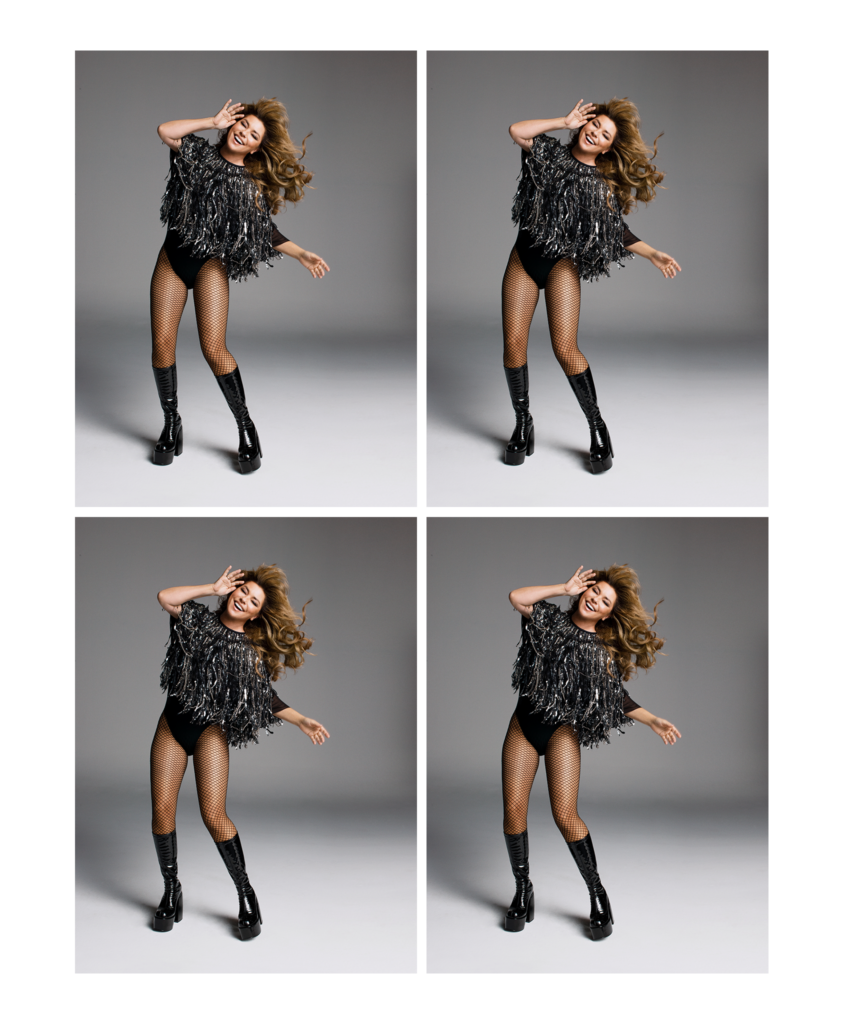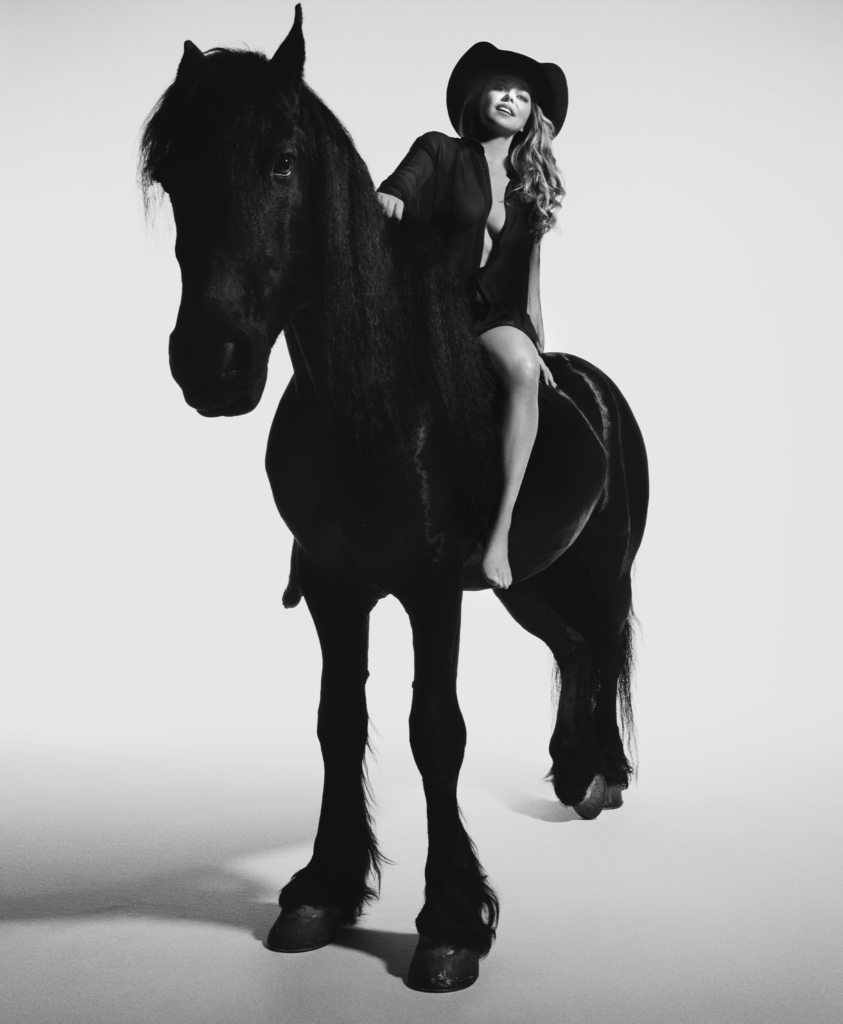COVER
Shania Twain
Is The Queen of Rising Up
By Emily Rosati
Publishing date: Feb 03, 2023
T
Transcending tragedies and transforming them into triumphs is something Shania Twain is no stranger to, embracing each feat like a familiar friend. With open arms she accepts the absurdity of life—a remarkable performance of good faith—knowing she can call upon her resilience and inner strength that we’ve seen her deploy time and time again. It came as no surprise that the title of her highly-anticipated body of work, Queen of Me, embodies this idea and carries her story in its name, both acknowledging her past and looking forward with intention. “It’s a statement—a mantra I am telling myself. It’s an affirmation. I am reminding myself that I am responsible for myself. For the good and the bad. I’m going to make some good decisions, I’m going to make some bad ones. But, at all times, I am the Queen of me,” Shania shares with me, radiating light and wisdom that refuses to be compromised by a computer screen or any trials of a Zoom call. She assures me that the sentiment is all about taking charge. Once you accept that who you are may transfigure from one moment to the next, as it has throughout your life and will continue to do so, you can find solace in the decision to always commit to yourself—“committing meaning, being unapologetic,” Shania adds with perseverance. As we indulge in the Shaniassance, in her music and lyrics that have the force to uplift any mood, we share a sense of catharsis with Shania as she reminds us that it is within our reach to shake off the past, rise up, and grasp on to joy.
Shania Twain settles cross-legged on a luxe, red chair that’s aesthetically reminiscent of a throne, no kidding, in a pair of jeans and a seemingly soft blue sweater, looking relaxed and grounded against the juxtaposition of a grander, more theatrical home. The metaphorical value of this setup is not lost on me. It feels evocative of an intimate sit-down from her 2022 Netflix documentary Shania Twain: Not Just a Girl, in which she shared the tribulations of her early life raised in an unstable home and losing her parents, snowballing into her career, and then adulthood in which she faced additional challenges that not even fame can shelter you from, including confronting Lyme disease and the near loss of her voice for good. In comparison, she opens up now about what she is awaiting in this next chapter of hers. Brimming with gratitude, she’s looking forward to celebrating the newfound appreciation that she has “on many levels” and sharing what she’s put together as a body of work. “I’m very grateful to still be here. I’m grateful to have my voice. That I can still record an album. That I can still go on tour. I’m also just grateful to be a songwriter—someone who is creative enough to go through COVID, which was such a dark time, and say ‘okay, I’m going to [be] alone with my guitar and change my frame of mind. I’m going to write songs [and] repeat lyrics that are happy and cheerful, pick the beat up until I want to dance, say things that make me want to smile and laugh,’” she tells me, making mention of her hospitalization and battle with COVID Pneumonia.
Transcending tragedies and transforming them into triumphs is something Shania Twain is no stranger to, embracing each feat like a familiar friend. With open arms she accepts the absurdity of life—a remarkable performance of good faith—knowing she can call upon her resilience and inner strength that we’ve seen her deploy time and time again. It came as no surprise that the title of her highly-anticipated body of work, Queen of Me, embodies this idea and carries her story in its name, both acknowledging her past and looking forward with intention. “It’s a statement—a mantra I am telling myself. It’s an affirmation. I am reminding myself that I am responsible for myself. For the good and the bad. I’m going to make some good decisions, I’m going to make some bad ones. But, at all times, I am the Queen of me,” Shania shares with me, radiating light and wisdom that refuses to be compromised by a computer screen or any trials of a Zoom call. She assures me that the sentiment is all about taking charge. Once you accept that who you are may transfigure from one moment to the next, as it has throughout your life and will continue to do so, you can find solace in the decision to always commit to yourself—“committing meaning, being unapologetic,” Shania adds with perseverance. As we indulge in the Shaniassance, in her music and lyrics that have the force to uplift any mood, we share a sense of catharsis with Shania as she reminds us that it is within our reach to shake off the past, rise up, and grasp on to joy.
Shania Twain settles cross-legged on a luxe, red chair that’s aesthetically reminiscent of a throne, no kidding, in a pair of jeans and a seemingly soft blue sweater, looking relaxed and grounded against the juxtaposition of a grander, more theatrical home. The metaphorical value of this setup is not lost on me. It feels evocative of an intimate sit-down from her 2022 Netflix documentary Shania Twain: Not Just a Girl, in which she shared the tribulations of her early life raised in an unstable home and losing her parents, snowballing into her career, and then adulthood in which she faced additional challenges that not even fame can shelter you from, including confronting Lyme disease and the near loss of her voice for good. In comparison, she opens up now about what she is awaiting in this next chapter of hers. Brimming with gratitude, she’s looking forward to celebrating the newfound appreciation that she has “on many levels” and sharing what she’s put together as a body of work. “I’m very grateful to still be here. I’m grateful to have my voice. That I can still record an album. That I can still go on tour. I’m also just grateful to be a songwriter—someone who is creative enough to go through COVID, which was such a dark time, and say ‘okay, I’m going to [be] alone with my guitar and change my frame of mind. I’m going to write songs [and] repeat lyrics that are happy and cheerful, pick the beat up until I want to dance, say things that make me want to smile and laugh,’” she tells me, making mention of her hospitalization and battle with COVID Pneumonia.

I don’t always bounce right back. I’m not saying that it’s even remotely normal to be pulled down and expected to bounce up like nothing ever happened. I don’t think I’ve ever done that.
I don’t always bounce right back. I’m not saying that it’s even remotely normal to be pulled down and expected to bounce up like nothing ever happened. I don’t think I’ve ever done that.

To adequately process the trauma of the COVID pandemic, as to not let it go unchecked and chew away at our ability to live our lives as instinctively as we did before 2020, is an ordeal in itself. Shania upped the ante and translated this healing into her highly energetic and buoyant album Queen of Me, a process that is seemingly attached to her philosophy in life, “if you can’t prevent a tragedy from happening, all you’re left with is how you’re going to deal with the tragedy after it has happened. At some point, you realize that the light is shining out there, outside of this, and all you’ve got to do is find it. You have got to believe that it exists.” Amidst receiving the how-to move through grief, by the vetted champ herself, she assures me that joy is out there for everyone to find—and that she too will draw the line at jogging, phew.
For Shania, the light is to be found in creating what she wants to materialize in the world, equipping her with a unique self-help and resulting in deeply inspired songs such as “Inhale/Exhale AIR” that remind us to appreciate subtle moments that make us human, like feeling the wind on your face or the faint rhythm of breath in our chest. Though her positive outlook and resilient nature feel fresh in light of the collective upheaval that transpired globally over the last few years, it is deeply rooted in her discography. Traceable in songs such as “Up!” the title track from her 2002 album, the nature of her resilience has been evident far before the imposed challenges of her life had yet been brought to her doorstep. Far before that, this common thread of rising above the clouds where the skies are clear has been weaved throughout her milestones.
It’s possible to build a tolerance to emotional and physical distress, and Shania Twain is quick to point out the convolution of where resilience meets toxic positivity, a hallmark of the latter being that positivity is a sign of resilience. “This cope-ability thing is, it seems to be so random. You look at families and communities where some people survive it, and some people don’t,” she continues, “some people are stronger for it [and some] people are weaker for it. I’m not a psychiatrist, I don’t understand why this happens. But, I would say that my level of resilience is very high.” In this vein, perhaps the ability to tolerate turmoil builds the resilience we need to face every challenge with a no-quitting attitude. “I don’t always bounce right back. I’m not saying that it’s even remotely normal to be pulled down and expected to bounce up like nothing ever happened. I don’t think I’ve ever done that,” she shares, her level of openness astounding me, “setting your boundaries [on] how long I’m going to stay in this prison of fear, or whatever it is I’m experiencing, is up to me.” It becomes obvious that this is akin to the tale old chicken-or-the-egg conundrum, and myself not being a psychiatrist either, the answers remain unclear.

What is clear is that Shania has always had the agency to be a trailblazer, the first public display of her pliable character was when she moved to Nashville in the early ‘90s, from the small Canadian town of Timmins, Ontario, and brought her rebellious feminine energy with her to the somewhat conservative genre of Country. “I was a disruption to the image of country music,” she shares in Not Just a Girl, unafraid to give herself her flowers. She paved the way for the next generation of women in music, from fellow country artist Kelsea Ballerini, who has gone on to pay homage by recreating “Man! I Feel Like a Woman!” in a performance at the ACM Honors, to Rihanna who once credited Twain for being one of the divas she admired in her youth. Shania Twain never had to resort to explicitly declaring her feminist intentions, but shifted the culture by being unapologetically herself, following the advice she would give me thirty years later. Her songwriting was doubted, coming from, in her own words, “a spicier place”. She accepted the reset of her expectations leading up to her first studio, self-titled album Shania Twain, and realized she’d have to work several times harder than her male counterparts. She leaped to marry pop and country, with notable collaborator—and now ex-husband Mutt Lange—to craft her three following albums The Woman In Me, Come On Over, and Up!, all of which attained diamond status. To put this accomplishment into perspective, only 92 albums are diamond-certified, with Twain holding down three of those spots.
I’m always going to want to do better: create better things, write my best song, [and] be wiser. I’m just never going to stop that pursuit. I don’t think success, fame, or even respect, puts an end to that, [that’s just] my nature.
At that point in her career, her first monumental turning point came in the form of her very first music video for the song “What Made You Say That?”. She channeled the residual creativity she was left with, considering the limitations of freedoms on her first studio album, into creative direction and styling. This vehicle of expression for Shania set her heart on fire—and most of America’s, with the introduction of the midriff top to the country music scene. Twain had a vision of how she wanted to present herself, and with an unwavering determination, she was going to make it happen. We know how this story goes, having lived through the cultural impact of the music video for “That Don’t Impress Me Much” off of Come On Over—anything leopard pattern will still receive the well-due “that is soo Shania” compliment. In retrospect, her bouncebackability and ferocity are similar to that of a cat and its nine lives, which makes the feline print all the more fitting.
Now, the pressure has adapted, shifting away from the baggage of being a young, emerging female artist to that of being an all-around well-respected creator—though, she admits the feeling of receiving respect after many years of success is a good one. “I’m always going to want to do better: create better things, write my best song, [and] be wiser. I’m just never going to stop that pursuit. I don’t think success, fame, or even respect, puts an end to that, [that’s just] my nature,” Shania tells me, making the distinction between past external pressure and the current internal push to strive for better. Being the go-getter she was, putting out consecutive albums and receiving successive accolades to match, it’s not surprising that she wasn’t exactly focusing on them while they were happening, with her laser-sharp focus five steps ahead. “Now, I am able to look back on them, [especially] with the documentary Not Just A Girl. It was good for me to look back at all of the achievements and [also] hurdles that I have gotten through, around, and over,” she reveals, “I felt a sense of accomplishment, after seeing it all back, in retrospect. And, I mean, there were so many more hurdles after [my] recording success. The biggest one was my voice [which was] a huge setback. I persevered. So, I would say, hooray for perseverance.” With this sense of adaptability well into adulthood, she asserts herself as a cross-generational role model.

As Shania, now 57, speaks candidly about her perception of her adulthood, an introspective thought occurs to me, realizing how rare it is that adults will speak on resilience and adaptability. When you think about it, it checks out on the surface— it’s natural to become more settled in a predictable, monotonous routine. However, this is not to say that adulthood does not pose challenges of its own, from parents getting older to your children fleeing the nest—a more detailed repertoire of examples to come when I get there. To be frank, not only the music industry, but society itself scrutinizes women without mercy, for their appearance and their milestones, particularly post-motherhood, as if you’re no longer eligible to have sex appeal or your career ambitions have to be put to bed.
“We are facing this from the very beginning of our lives. We all have it in us to survive it,” she prefaces before sharing an intimate, yet familiar, coming-of-age story, “I remember when I was younger, I lost my front teeth. So when my adult teeth started coming in, I had these gaps. I mean, it was not attractive. I was not the pretty one out of the three [sisters]. I was shy about smiling. Boys thought it was ugly and they would express that it was ugly. I’m just pointing out one thing that made me feel insecure, but we all have these things that we don’t like or that other people don’t like and openly say it. None of us are immune to that. Aging doesn’t make us vulnerable to this.” No matter the variable, whether it’s your teeth or otherwise, the moral of the story remains true. “We should know [this] by the time we’re older. I say to myself, ‘look, you’ve already been through so many things, it’s just aging!’ And you’re not going to change it. Every month or week that you look in the mirror with the lights on, you’re probably going to look older. So you better [use] all the skills you’ve learned in your life to love yourself, to deal and manage your state of mind through that scrutiny,” by living authentically, Shania simply combats these taxing burdens, remaining a beacon of light and inspiration for women of all ages, Gen-Z to Boomers all within her reach.

This radical self-acceptance Twain can exercise is unique, and likely easier said than done. Her best advice, she tells me, “hang around with people that love you for who you are.” This facilitation of togetherness is another element that has always lingered in Shania Twain’s shadow. Think about it, whenever a group is in a karaoke room, it’s only a matter of time before the call to arms “let’s go, girls” from “Man! I Feel Like a Woman!” booms. “It’s a community thing,” Shania exclaims excitedly, “I think that it belongs to everyone that knows what it is to be picked on or to be overpowered.” We speak of the rallying cry as if it is an entity of its own—a spirit brought to life after 26 years of being ritually chanted in karaoke rooms around the world. Though fun and lighthearted, Shania’s intentionality runs deep, “I do think that when you are alone in something, you are naturally more vulnerable. Reminding everyone that they’re not alone, is a lot of what that song is about. I am pro-sticking together when you’re feeling threatened.” However, if you were to stumble upon Shania Twain in a karaoke room, she admits she’d likely opt for something less obvious, and more melancholy, to the effect of Glen Campbell’s “Wichita Lineman”.
Shania Twain isn’t only advocating for unity in people. When asked if there was one thing she would change about the music industry if she could, she beamed, “it would be unity in genres. Stop the division. We’re all listeners, we all love music. Let us decide what we want to listen to, put it all out there, and leave it up to the listener.” In the 90s, Shania Twain blurred the lines between pop and country music to dominate the charts globally. On the continuous journey to stopping the division, her album Queen of Me bleeds new wave rock with “Waking Up Dreaming,” folk-pop “Last Day of Summer,” disco-esque “Number One”, and country-rock “Giddy Up!” putting her money where her mouth is. More than ever, Shania is looking forward. Preparing to embark on the Queen of Me Tour, Shania Twain is keen to gather data on the fan favorites, “I’m still, you know, putting together the song list for the [tour]. I’m not putting any of the new songs into the show list until I know what everyone’s favorites are,” always eager to put on the most memorable, and striking performance.
Photographer: Louie Banks
